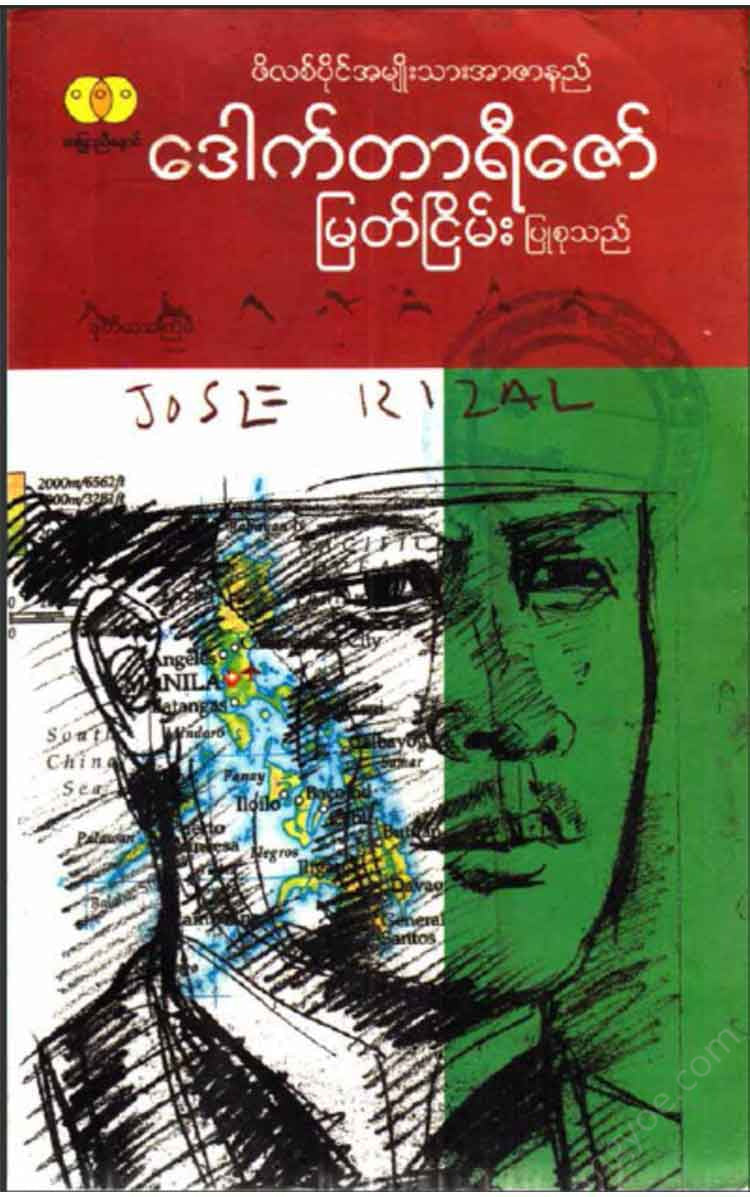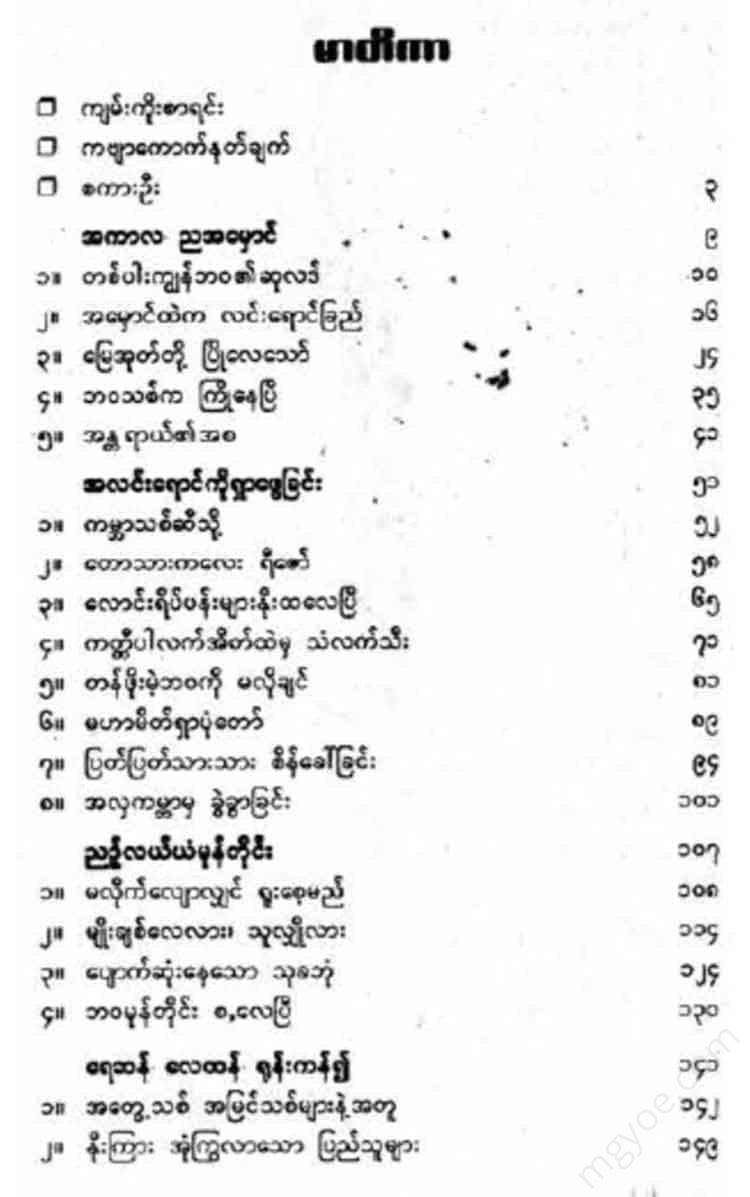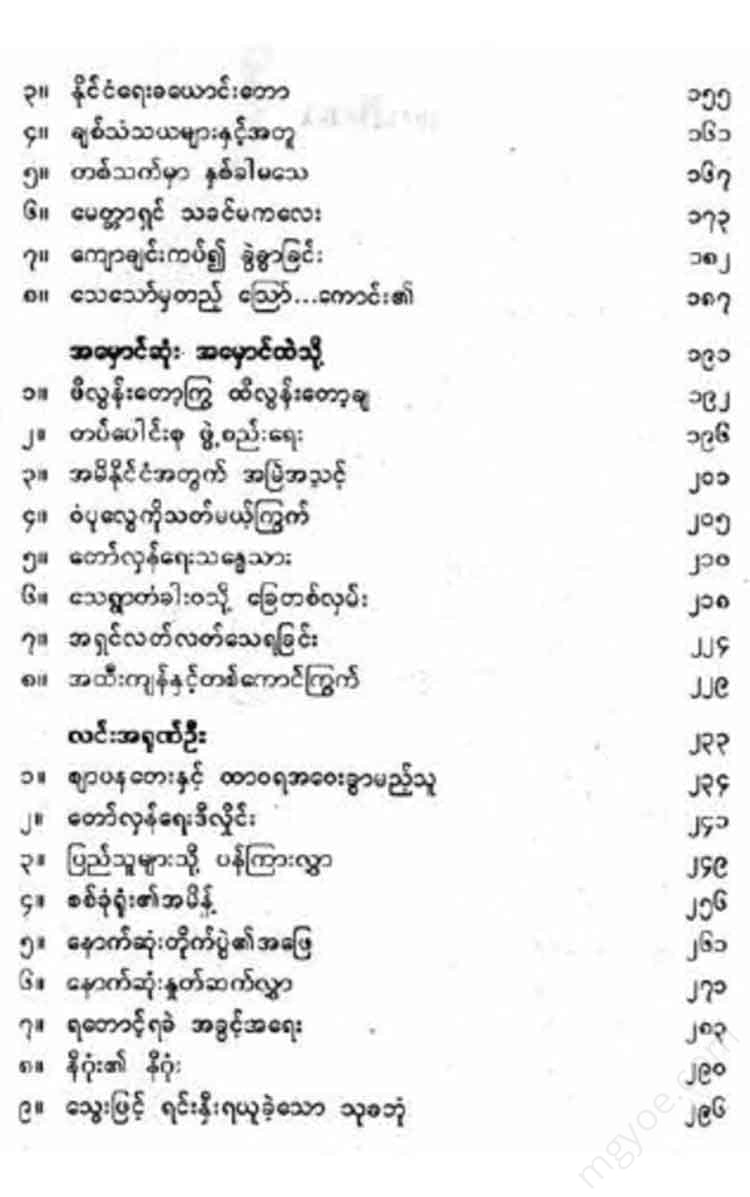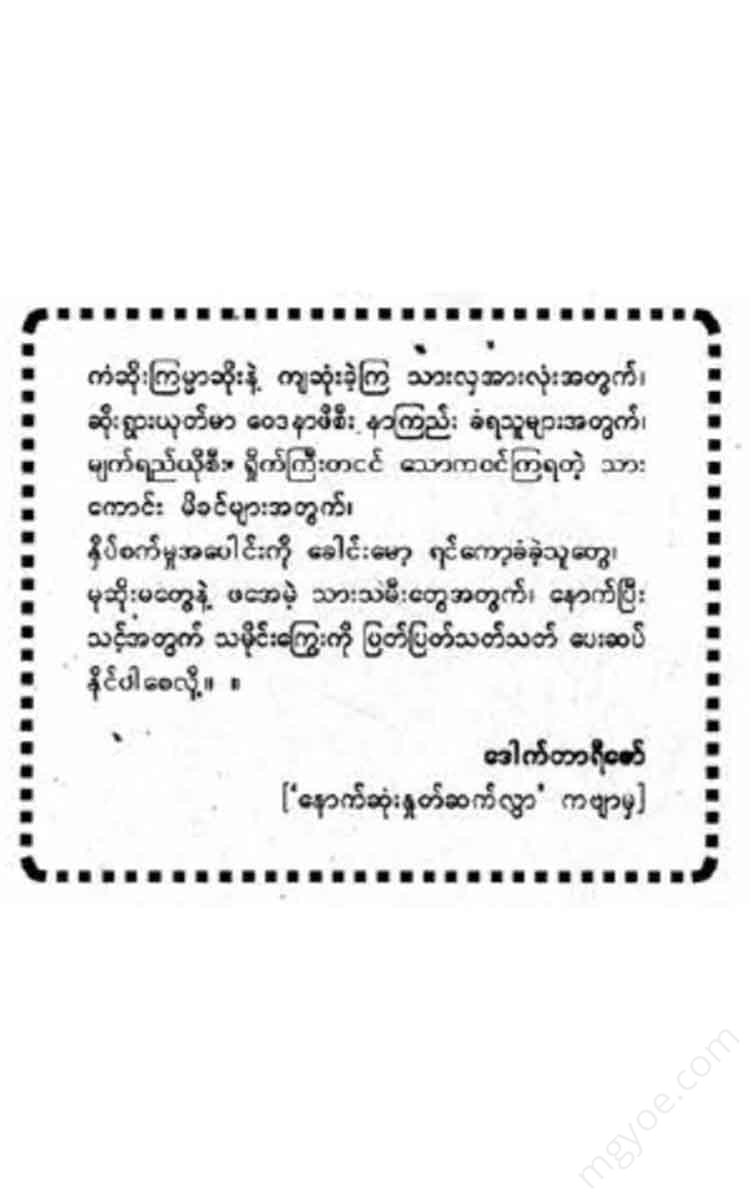Other Websites
Myat Nyein - Philippine National Martyr Dr. Ri Zaw
Myat Nyein - Philippine National Martyr Dr. Ri Zaw
Couldn't load pickup availability
Foreword by the author of this book
(1)
I entered the world on the 8th day of the full moon of Ta Saung Mone, crying softly. - I don't know what meaning the cries of other newborns carry. The cries of the newborn I will become will be a cry of joy.
- Because the day I was born on the 8th of the full moon of the Ta Saung Mone month is also the day of the Lord Buddha.
It was the day that the Burmese King Thibaw was captured by the British colonialists. In other words, it was the day that Burma was plunged into slavery.
Coincidentally, I was born on that day, I don't know if I was born with a natural instinct. I hated imperialism. I hated it. When I got older and was able to read literature, I had the opportunity to understand imperialism and capitalism. I learned to hate those systems.
Although I did not personally experience the hardships of Burmese slavery under colonial rule, I was moved as if I had experienced them firsthand.
The venerable Sibanni Sayadaw
The throne is empty, the palace is empty, the city is empty.
With thirty-five, the end is near.
To be human in an era of extinction
For us, it's better to die than to be right...
Reading such poems and literature, I felt compassion and pity for our ancestors who had to endure a life of oppression and humiliation.
At the same time, I realized the essence and value of our own sovereignty and independence. Wasn't it the life, blood, and sweat of countless Burmese patriots that were invested in the acquisition of this noble and lofty result?
Myanmar and the Burmese people struggled under the colonial yoke for over 100 years. The legacy of colonialism is still felt today, and it is still being fought to be removed.
Like Myanmar, most Asian countries have been "patrolled" by powerful colonial powers.
Among them, the Philippines was also a victim of colonialism. For nearly 400 years, it suffered from the invasion and abuse of old and new colonialists. Filipino patriots sacrificed many lives to escape this evil.
Dr. Ye Zaw is one of these patriotic heroes.
Dr. Ri Zaw is the light of the Philippines. He was the first to expose the oppression and oppression of the Filipino people for over 300 years during their slavery. He was also the first to boldly present the true life of the Filipino people, who were politically oppressed, intellectually blinded, and exploited and bloodthirsty under the guise of religion.
In addition, he was a person who opposed Westerners who held onto the ideology of nationalism and exalted themselves by seeing Asians as barbarians, inferiors, and subordinates to Westerners. Easterners and Westerners are all equal. No race is born with more rights. He also held the slogan that hard work and discipline are the key.
His modern outlook and active convictions helped to awaken the Filipino people, who had been oppressed for centuries, to a sense of patriotism. Their political awareness was awakened. They realized that they should demand independence.
"No Westerner has any sincere interest in us Asians without their own interests," said the People's Republic of China. Just like the words of the late Premier Zhou Enlai, Filipino patriots are brutally oppressed. They are brutally murdered. They are brutally tortured.
However, no colonialist has ever killed or killed patriotic martyrs who would sacrifice their lives but not their faith.
Thus, under the leadership of Dr. Ye Zaw, the Filipino people, who had fought for many years, finally achieved victory. On July 4, 1946, they gained independence and self-sovereignty.
Dr. Ye Zaw was a politician who boldly criticized those who invaded and encroached on his land. He was also a poet and writer who led the movement to open up the political and educational knowledge of the entire people. He was the gun of the capitalist colonialists.
He was also a patriotic hero who steadfastly faced adversity and inspired the patriotism of the Filipino people.
But Dr. Ye Zaw was also only human. He was not a great hero who was blameless from beginning to end like in ancient legends. He had his flaws and weaknesses. However, his achievements and sacrifices were able to cover these faults.
A contemporary of Mahatma Gandhi from India and Dr. Sun Yat-sen from China, Dr. Yi Zaw was a gentle man. He loved peace. Yet, when it came to his homeland, he was a fierce and fierce man.
His kindness is too great for the Filipino people to repay.
"I died before I could see the red sun rise over our country. Those of you who will see the dawn, welcome the red sun. And do not forget the comrades who fell in the darkness of the night."
In accordance with his dying instructions, the Filipino people have honored and continue to honor Dr. Ye Zaw and those who died in the anti-colonial struggle. In the Philippines, Dr. Ye Zaw's birthday is declared a national holiday. The day Dr. Ye Zaw was executed is declared National Heroes' Day. Dr. Ye Zaw's statue and stele
A great and noble person like Dr. Ye Zaw is not someone whose name will die even after death. He is not someone who will be forgotten even after a long period of time. He is not someone who will disappear.
If you read about him and his life, there are certain things that inevitably come to mind. These are the political views on the brutality of imperialism and the fate of countries and peoples who are subject to foreign rule.
At the same time, I believe that young people will be able to experience the priceless value of freedom, the spirit that should be placed on the motherland, and the vigor of active youth. (In writing about Dr. Ye Zaw's life, I have tried to highlight Dr. Ye Zaw's character as much as possible. I have tried my best to write about him from beginning to end in accordance with his character. His character is cold. Gentle. However, in his political ideas and beliefs, he is brave. Clear. I don't think it would be wrong to call Dr. Ye Zaw an iron fist in a velvet glove, or a red-haired blue. (If the above-mentioned orientations and character traits are not evident,
If Lwin is not clear, it must be due to the inexperience of the author of this book. Since I am not yet experienced in writing, there will be gaps and weaknesses, so if you can criticize and point out, I will gladly accept it.
If reading this book leaves "something" in the reader's mind, then this book has come true.
I would like to record the writer Maung Paw Htun, who was the main driving force behind this book. I would also like to record my special thanks to Saya U San Lwin, Dat Htun, Nyo Myint (Nail), U Kyaw Nyunt (Aung Kyaw U Sae Pyay), Lu Aung, and the Chindwin Sae Pyayyar Library, who helped and supported the author of this book both physically and mentally.
Peace
3, January, 77.
[ 1 ]
The result of a life of slavery
Brother, when he was unaware, a ten-year-old boy was walking by. He seemed lost in thought. He didn't look at the road, he didn't move. His eyes were fixed on the road.
What thoughts are running through his head? How serious and important are the issues that he keeps thinking about?
Suddenly, he saw a shadow flash in front of him. The boy stopped. He came back from the world of thoughts to the real world. He looked up. A man in full military uniform. Was it a captain from the Civil Defense?
The captain suddenly pulled the boy's shirt. The captain seemed very angry about something. Then, without saying anything, he swung his hand at the boy and hit him. The boy was completely surprised, not expecting this. When the shock and shock wore off, the captain had already beaten him again and again. His shirt was already torn.
The incident happened so fast. It seemed like it would only take a flash of lightning.
When the child realized his true identity, the captain was no longer with him. He continued his journey peacefully, as if nothing had happened to the child, who had been treated so poorly for no reason. The child...
The child clenched his fists tightly. He stared at the back of the big, powerful figure who had just shown his fists. His eyes were filled with hatred, disgust, and even tears of resentment.
The child does not yet know his guilt. What kind of crime has he committed? Whatever he has committed, how serious is the crime?
When he reached the door, his mother gave him a loud, loud cry. The boy told her everything. Only then did his mother explain and he realized the great crime he had committed.
The greatest crime he committed was not bowing to the military officer who walked in front of him.
The incident was stuck in Ye Zaw's head like a nail. He also learned something from the incident. What is the life of a slave under foreign rule like?...
Ye Zaw is the rabbit of the East. The one who rode above the mountain and fell was the wolf of the West.
The Filipinos, who are Asians, are gentle and gentle. They love peace. They want to live in peace and quiet. The Filipinos, who want to live in peace and quiet, lived in the Philippine archipelago, which was conquered by the Spanish. The Spanish had ruled since 1565, and by the time of the birth of the Filipinos, it had been three hundred years.
The Filipino people, who were struggling to hold their heads up under the colonial yoke, were oppressed. They were forced to serve.
They are oppressed. Suffering is only a source of gain for them.
I don't feel full when I eat. I don't feel beautiful when I wear clothes. I don't feel comfortable when I live.
It was during this era when the entire country was lying prostrate under the sword of imperialism that young Ye Zaw arrived in this great world. (June 19, 1861.
Francisco Mercado and Teodora Ayanzo had eleven children, of whom José Rizal was the seventh.
North is the youngest child. Among his siblings, he and his two older brothers are the only males.
"Take good care of this child. One day he will become a great and noble person."
A Filipino priest read this prophecy on the day of Jose Rizal's christening. Teodora didn't take it too seriously. She had a whole bunch of other children to take care of. Isn't a good mother supposed to care for her children equally, and love them equally?
There was one thing that Teodora noticed about Jose Rizal. It was that he was born more difficult than his other siblings. In addition, the little boy was very thin, with a big head. He was also a little boy. Who would have thought that such a weak child born in such a time of chaos would one day become a great leader of the country that the world would recognize?
There was only one thing that made Ri Zaw lucky. It could be said that he was lucky to come into the family of Francisco and Teodora.
Francisco was a respectable gentleman. He was a businessman. He was hardworking. He was calm. He was friendly. Teodora was a modern scholar. At that time, she was a rare and intelligent woman among Filipino women. She studied at the Dominican College in Manila as a child. Her parents were wealthy. They were modern scholars. They were the city's elite. As a result, young Ri Zaw had better opportunities than other Filipino children in terms of education and social life.
The town of Calamba, where the Ri Zaw family lived, was a crossroads. Therefore, when traveling Spanish officials needed to stay overnight on their journeys, they would stay at Francisco's house.
Francisco, who was a member of the wealthy class, was well-connected with the Spanish government. He was also acquainted with the Spanish clergy and military officers. He even gained their respect. The Spanish treated Francisco's family with almost equal respect.
If even a young man named Ri Zaw, who was part of such a wealthy family, was beaten by a Spanish officer, then there is nothing to say about other ordinary Filipinos. Except for a handful of people, the entire Filipino nation is enslaved. They are oppressed by race, both as a ruling race and a ruled race. They are beheaded.
The extent of the oppression and the extent of the use of bigotry can be seen from an edict issued by the Spanish government. The edict stated that any Filipino who saw Spanish officials passing by was to immediately remove his hat and bow. This edict was strictly followed in Manila. However, in other areas, instead of Spanish officials, they removed their hat and bowed to any Spaniard they encountered. Not only that, but when they met Spanish priests, they bowed their heads and kissed the priest's hand as a sign of respect.
The Filipinos, who number about six million, are oppressed politically and socially. Not only that, but they are also economically inefficient. All business in the Philippines is monopolized by the colonial capitalists. The colonial government has a monopoly on 400,000 acres of farmland. These false monks, called friars, do business under the pretext of religion. They collect various taxes. They are ruled like colonists and vassals. They are supported and protected by the Spanish authorities.
Then, the ethnic people, who were not only poor but also worked hard to eat and drink. They were thirsty while rafting. They were unable to raise their heads economically and socially, so their education and political status were low. Being so low, they could not escape from being slaves to others. The last question is why the tree was able to grow.
In this modern desert of suffering, where all these negative thoughts are swirling, the surroundings of the Ye Zaw family are like a small spring.
It is not the one who is drowning in opportunities. While his relatives have plenty of water to drink, the whole surrounding area is full of thirsty people. Those who yearn for a single drop of clean water are suffering,
But they didn't know how to find that spring. They didn't understand how to dig for it. And no one showed them the way, no one showed them the way.







